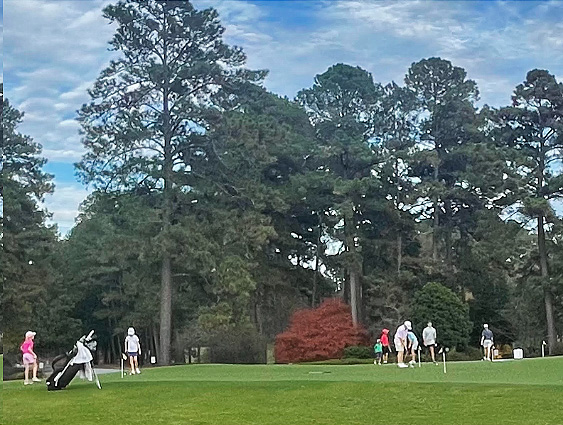While junior golfers often use summer as a time for tournaments (and hopefully a little rest and relaxation), it’s also a great time to sharpen their skills through summer golf camps. Camps are not only a great way to improve swing mechanics, short game, and course management, it offers chances of connecting with PGA professionals and other junior golfers who likely live within the area.
As a parent of junior golfers, I’ve enrolled our children in a fair number of golf camps, ranging from beginner-friendly to camps hosted by D-1 golf programs. Like so many aspects of junior golf, selecting the right junior golf camp depends on a few factors and we had to “figure it out” each summer as our kids grew up and their skill level changed.
Before you spend your hard earned money, let’s look at the key considerations.
How do I know if my child is ready for a junior golf camp?
If your child has expressed any interest in golf, then you may be tempted to sign them up for the first camp that comes along. While their interest is certainly a top consideration, they should also be mature enough for coaching instruction and willing to put in the practice on camp days.
It helps if they have basic golf skills, but if they’re brand new to the game of golf then you’ll need to sign them up for a beginner-level golf camp.
What junior golf camp should my child participate in?
In my view, choosing the right junior golf camp depends on your child’s current skill level, experience, future goals, location, and budget. If they’re just starting out their golf journey, then their needs will look different then someone trying to catch the eye of a college golf coach. Each golf camp should provide a detailed description of the best age and skill level it’s designed for, but you can typically break it down into a few categories.
Beginner junior golf camps
Ideal for young players who are new to golf, these camps focus on building a strong foundation, covering basics like grip, stance, alignment, swing fundamentals, basic rules, and etiquette. Sessions are usually fun, low-pressure, and filled with lots of games so it keeps the participants engaged. You can find these camps at local golf courses (including private clubs) or organizations like The First Tee and PGA Junior League.
Intermediate camps
Best for junior golfers who have some course experience and want to take their skills to the next level. Camps at this level typically offer deeper instruction on short game, course management, swing refinement, and introduce them to competitive formats like scrambles or mini-tournaments. Check out the PGA Junior League, Nike Junior Golf Camps, or the PGATour Golf Academy at World Golf Village.
Advanced or elite camps
Designed for experienced junior golfers who are actively competing in tournaments and use a more intensive, individualized approach. They often emphasize advanced swing analysis, physical fitness, mental game coaching, detailed shot shaping, and preparation for high-level junior tours or college recruitment. The PGA Junior League offers advanced options, but you can find places like IMG Academy offering advanced instruction throughout the summer.
College campus camps
Hosted by college golf programs, these camps allow juniors to work with college coaches, experience top training facilities, and learn what it takes to play at the collegiate level. While the camp may be hosted at one college campus, there are typically a number of coaches from different schools in attendance. Some camps even include recruiting seminars, strength and conditioning programs, and Q&A sessions with current college golfers and coaches.
Many of these camps are open to younger players and a wide range of skill levels, but involve staying overnight on the campus. They’re almost always the most expensive camp option, but I know from personal experience that a junior golfer can connect with college coaches they might not otherwise have the opportunity to meet.
Does a junior golf camp help my child in the long run?
As beneficial as junior golf camps are, they do require scheduling them during the busy summer months and a serious financial commitment (in some cases). Is it worth it for you and your child to go through this extra effort?
For the younger golfers, I think anytime you can associate a fun experience and great memories with playing golf then it will encourage them to continue learning. Golf is a frustrating sport, so having a positive association with it from an early age is so critical, even if they don’t go on to compete in tournaments. It’ll help them think of golf as a way of meeting new friends and learning new games in a relaxed setting.
Enrolling in a junior golf camp early in their golfing journey and receiving the positive coaching reinforcement may be the spark they need to continue learning. Or, your child may want to attend just for the ice cream party at the end. But if it motivates them to get outside and learn something new, then it’s definitely worth it.
Will it help my advanced junior golfer?
For more advanced golfers or those eyeing a chance to play in college, I do think summer junior golf camps offer plenty of benefits as well. While they may already have a golf coach they see on a regular basis, a group camp setting is equally important for making connections, continuing the positive association with golf, giving them more exposure to better competition and more coaches, and as a confidence building experience.
Advice from one junior golfer parent to another
If you think your child would benefit from a junior golf camp program, then I encourage you to start researching well before summer. Many of the popular programs fill up quickly (especially the college series camps) and summer schedules can be harder to work around. If it feels overwhelming to find “the best” golf camp near you, then start with the local public course (or your own if you’re a member at a private country club) and go from there. A great junior golf camp is worth the extra effort!

